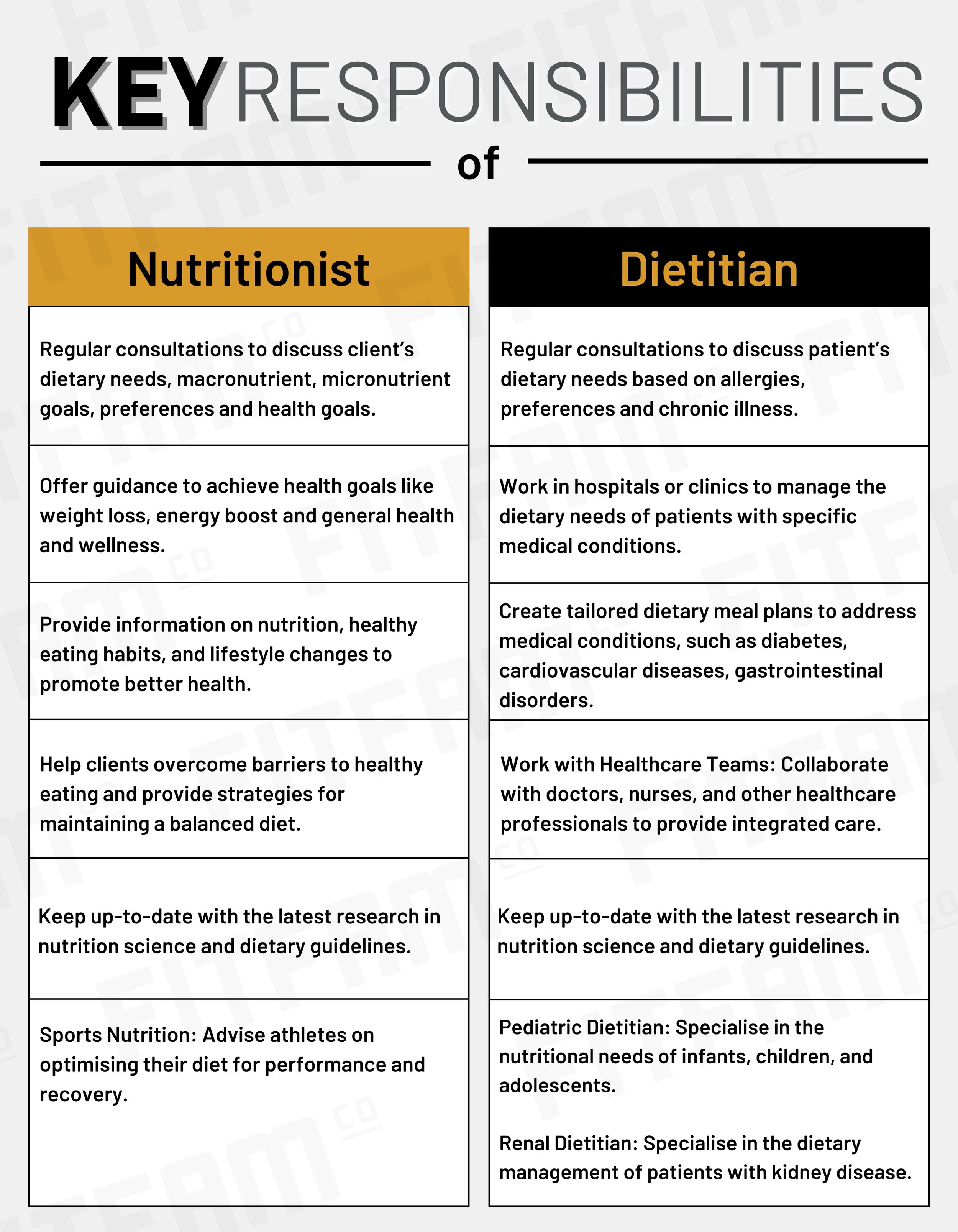Dietitian VS Nutritionist: The Difference & Who to engage
Dietitian VS Nutritionist
What is the difference between a nutritionist and a dietitian? The debate of dietitian vs nutritionist is ongoing, with many people using the terms interchangeably, assuming they refer to the same profession. Well, both professionals just tell me what to eat, right? Not quite. While both provide guidance on dietary habits, their roles and qualifications can differ significantly.
In Singapore, there are currently no statutory regulations governing the practice or protecting the titles of dietitians and nutritionists. Nevertheless, those in these professions can choose to register with the Singapore Nutrition and Dietetics Association (SNDA) to ensure they adhere to high standards of professional practice.
Nutritionists typically provide broad guidance, like nutrition counseling and meal planning, but they are not licensed to offer medical treatments. Conversely, dietitians have the credentials to address specific medical conditions, such as eating disorders, cancer, and diabetes.
Education & Training
Accredited Nutritionists of Singapore (ANS) have a minimum bachelor's degree in human nutrition. Some nutritionists may even have a degree in Food Science, Food Technology, specializing in human nutrition. This is usually a 3-year degree more popularly done overseas in countries like Malaysia, Australia, UK or North America. The programs are typically structured around (but not limited to) sciences like biochemistry and microbiology, social sciences and nutrition in the community and population health.
Accredited Dietitians of Singapore (ADS) have a bachelors or masters degree in human nutrition and dietetics, with a minimum 6 month clinical internship as part of their program. More recently we have a local program in Singapore inclusive of a clinical internship at Singapore Institute of Technology (SIT) that will meet the academic requirements and clinical competencies for graduate entry-level professional dietitians in Singapore. Otherwise, they must have done an accredited Master’s degree in dietetics, some specializing in sports nutrition based on personal interest. A quick way to check the accreditation is to visit the relevant authority’s website, for example, Dietitians Australia will give you a list of accredited programs.
Defining the roles
You will probably find this statement in most articles that try to separate and define the two roles - all dietitians are nutritionists but not all nutritionists can be a dietitian, without the proper dietetic qualifications.
Nutritionist
Nutritionists work with the general public to improve nutritional diseases and disorders. Nutritionists can help you improve your relationship with food, achieve sustainable fat loss goals, prepare for a sports competition if they are sports nutritionists, among many others. Nutritionists are qualified to interpret research and convert them into bite-sized information for public awareness.
In the sea of misinformation today, they help the general population make informed dietary choices. At bachelor’s degree level, practising nutritionists are clinically trained to examine, assess, independently prescribe, treat, monitor and refer, in direct consultation with the public.
Nutritionists, as consultants in public health may work in the following, but not limited to:
Food policy and regulation
Food manufacturing
Develop programs and interventions for public health concerns
Private consultancy
Dietitian
Dietitians are recognized healthcare professionals with education, clinical training and experience to provide nutrition therapy. Nutrition therapy essentially refers to treatment based on nutrition. It may be something as simple as changing a patient’s diet or incorporating tube feeding. Nutrition therapy is an essential component in recovery from ailments and diseases.
Dietitians are able to use and decipher evidence-based medical approaches to treating chronic conditions through a tailored plan. They are also able to write customized meal plans that will best address your medical conditions.
Some examples of their roles not limited include: ensuring you are fed through the tube if you are admitted in the ICU, coming up with meal plans with precise nutritional breakdowns in hospitals, nursing homes or other patient care facilities, carefully feeding patients with any form of complicated gut diseases like Crohns, even to the extent of using an IV tube. A dietitian can also help you with diabetes, eating disorders, food allergies and intolerances, gastrointestinal diseases, heart disease, and renal disease.
Both nutritionists and dietitians are expected to advance their knowledge and skills constantly to ensure they provide evidence-based practice. In Singapore, this involves participating in ongoing education and professional development activities organized by the SNDA.
“Extra: Health Coaches”
Health and wellness coaches without the right qualifications, credentials and experience are neither nutritionist nor dietitians and if they are claiming to be qualified enough to be giving any form of nutrition advice, be very wary of them, irrespective of how convincing and confident they sound with their claims. Especially in today’s social media era, where anyone can jump on camera, yell a couple of very convincing statements without backing themselves up with proper research, and sell you the idea of a quick fix just in the hopes of making a quick buck.
Oftentimes these claims can be extremely detrimental to our health and cause serious health damage. This includes personal trainers, health coaches with diplomas and nutrition certificates. If they are giving nutrition guides or detailed meal plans without scientific knowledge, that can be very dangerous to the general public health.
Choosing the Right Professional for You
Should I see a dietitian or nutritionist? For general wellness, weight loss, weight gain, or sports nutrition, a nutritionist is usually more than sufficient. They are well-equipped with the right tools and knowledge to help you along your health and nutrition journey. As trained professionals, nutritionists can provide valuable guidance on healthy eating habits, weight management, and general nutritional advice tailored to individual needs. They can help with understanding food and nutrition labels and making better dietary choices.
A reliable nutritionist will never recommend cutting your favourite foods out of your diet in the name of health and wellness, unless you have done an intolerance or allergy test or if it is a temporary elimination diet. On the flip side, they will work with you to find space for all your favourite food without compromising on health. Finally, nutritionists will generally be more affordable than your accredited dietitian. After all, dietitians do spend extra time and money to obtain that extra bit of valuable credential.
On the other hand, dietitians, who are often required to have more advanced training and certifications, typically step in for more complex, clinical settings. These might include managing chronic diseases like diabetes, heart disease, or severe gastrointestinal disorders. It is then crucial for you to consult with an accredited dietitian, again preferably if they are on your local governing body’s website to ensure credibility. The governing body would have already looked at their qualifications, certificates and experience before listing them as an accredited dietitian, so you need not worry about that.
Take a look at the table below to see the differences between a nutritionist and a dietitian.
Conclusion
We hope this sheds some light on what is the difference between a dietitian vs nutritionist. Both nutritionists and dietitians are extremely important professions that are the backbone of nutritional health of our societies. They lead health promotion programs, identify gaps in nutritional science, debunk dietary myths, assist in improving the diets of our general population sometimes on a budget, and ensure our patients and clients are fed optimally. Who you choose to work with will entirely depend on your health condition, budget, availability and suitability. Another key thing to note is nutritionists’ regulation varies widely depending on the country or region.
When looking for a professional in Singapore, we strongly encourage you to look at their qualifications and experience. Ensure that this individual has a minimum bachelor's degree or higher, preferably registered with SNDA. This way you can be confident that at least the person you are working with has actual credentials and has done some form of continuing education.
While both nutritionists and dietitians play essential roles in promoting health, the average person seeking to improve their diet and lifestyle will find the support and expertise they need with a qualified nutritionist.
At FITFAMCO, we take immense pride in our team of highly qualified, certified nutritionists who specialise in health, nutrition, and wellness. We are passionate about helping our clients achieve their nutrition goals in a sustainable manner. To learn more about our nutrition coaching plans, click here to speak with one of our dedicated consultants.


